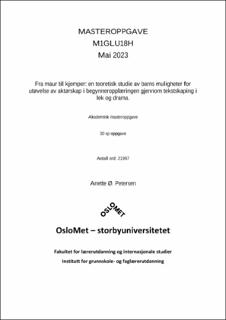| dc.description.abstract | Formålet med denne masteroppgaven er å kunne bidra til økt bevissthet og kunnskap om hva barns aktørskap kan innebære og hvordan man kan fremme økt aktørskap i skolens begynneropplæring gjennom meningsfull tekstskaping i lek og drama. Oppgaven har følgende problemstilling: Hvordan kan iscenesettelse av meningsfull tekstskaping gjennom lek og drama fremme aktørskap i begynneropplæringen? Forskningsspørsmål dreide seg om hvordan ulike former for aktørskap kommer til uttrykk, samt hvilke faktorer i klasserommet som kan påvirke opplevelse av aktørskap i tekstskaping i lek og drama. Faktorer som utforskes inkluderer innramming, lærerdeltakelse og fiksjonsramme. Bakgrunnen for oppgaven har utgangspunkt i tre temaer; 1) en lesediskurs der lesing har forrang over tekstskaping i skolen; 2) manglende aktørskap i begynneropplæringen som følge av en overgang fra aktivitet i barnehagen til passivitet i skolen; og 3) skolens juridiske og moralske forpliktelse til å fremme aktørskap i kraft av skolens styringsdokumenter. Oppgaven er teoretisk forankret i et overordnet perspektiv på barn som kompetente subjekter, og et multimodalt sosialsemiotisk perspektiv på literacy der barns tekstskaping forstås som multimodal meningsskaping i kontekst. I oppgaven foreslår jeg en ny teoretisk modell for konseptualisering av begrepet aktørskap, bestående av fire deler; kompetanse, autonomi, tilhørighet og mening. Modellen ble kalt AktørskapsPuslespillet (AP-modellen). Metoden for oppgaven er teoretisk, og datamaterialet består av 8 utvalgte studier om tekstskaping i lek og drama. Jeg benyttet tematisk reanalyse med bruk av AktørskapsPuslespillet som analysekategorier. Funn i analysen viste at alle fire aspekter ved aktørskap kom til uttrykk gjennom tekstskaping i lek og drama, og viser slik potensialet til lek og drama for å iscenesette meningsfull tekstskaping for å fremme elevenes aktørskap. Faktorene innramming, lærerdeltakelse og fiksjonsramme så ut til å kunne påvirke alle aspektene ved aktørskap, men på ulike måter. Størst ulikheter var det mellom aspektene kompetanse og tilhørighet i lek og drama. Funnene får implikasjoner for praksis gjennom å synliggjøre betydningen av læreres valg og planlegging med hensyn til innramming, deltakelse og fiksjonsrammer i lek og drama. Funnene tyder også på at AktørskapsPuslespillet kan benyttes av lærere som et analytisk verktøy til identifisering av elevers aktørskap, eller til evaluering av egen undervisning.
The purpose of this master’s thesis is to contribute to increased awareness and knowledge about what children’s agency may imply, and how teachers may promote increased sense of agency in the early school years. The following research questions were asked: How can fascilitation of meaningful text production through play and drama promote agency in the early school years? Additional research questions were concerned with how different aspects of agency may be expressed, as well as what factors in the classroom may affect the experience of agency while engaging in text production within play and drama. Factors that are being examined include framing, teacher participation and fictional frame. The background for the thesis is based on three issues: 1) a reading discourse where reading is privileged over text creation; 2) a lack of agency in the early years of school as a result of children experiencing a shift from activity to passivity with the transition from kindergarden to school; and 3) the school’s legal and ethical obligation to promote agency by the virtue of the curriculum and the Education Act. The thesis is theoretically embedded in a perspective of children as competent subjects, as well as a multimodal socialsemiotic perspective on literacy where children’s texts are understood as multimodal meaning-making in context. I propose a new theoretical model for conceptualizing agency, consisting of four aspects: competence, autonomy, connectedness and meaning. The model is names the Agency Puzzle (the AP-model). The method of the thesis is theoretical, and the data consists of eight selected studies on text production within play and drama. I used thematic reanalysis with the application of the Agency Puzzle (the AP-model) as categories for analysis. Findings suggest that all four aspects of agency were expressed through text production in play and drama, and thus highlights the promise of play and drama as contexts for fascilitating meaningful text production to promote pupils’ agency. Factors such as framing, teacher participation and fictional frame appeared to influence all the aspects of agency, but in different ways. Most prominent were the differences between competence and connectedness within play and drama. The findings suggest implications for praxis by drawing attention to the significance of teachers’ choices and planning with regards to framing, participation and fictional frames in play and drama. Findings also suggest that the Agency Puzzle may serve as an analytical tool for teachers’ identification of pupils’ agency in the classroom, as well as for evaluating their own instructional practices. | en_US |
